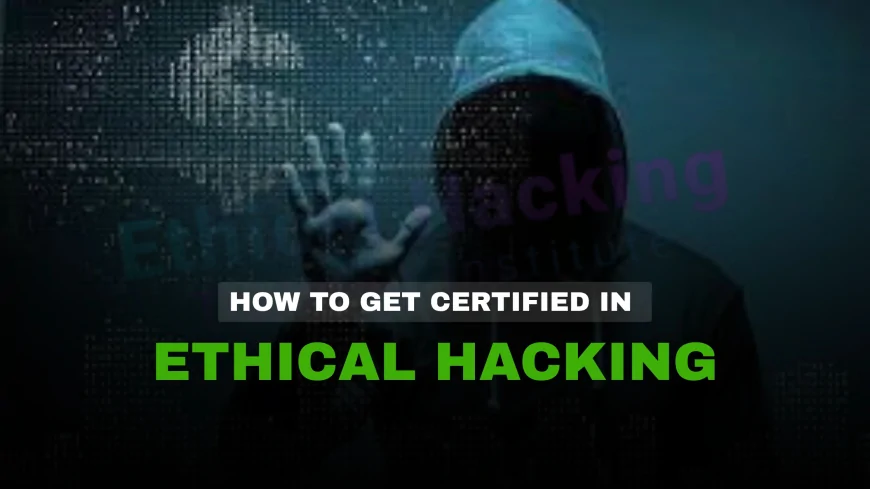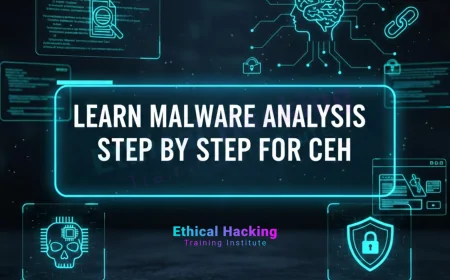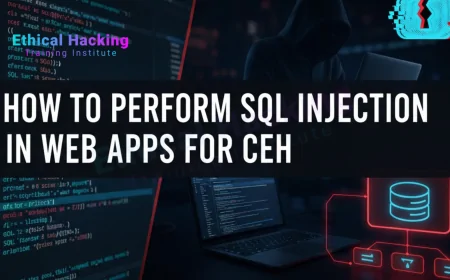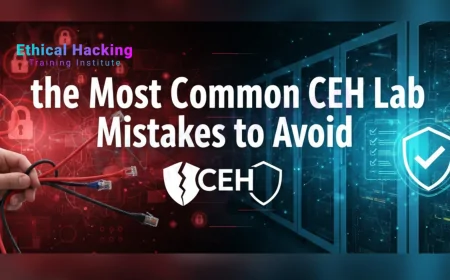How to Earn a Hacking Certification: A Guide to Getting Certified | Hacking Certification Guide: Steps to Become a Certified Ethical Hacker
Learn how to earn a hacking certification with this step-by-step guide. Explore CEH, OSCP, and other top ethical hacking certifications, training resources, labs, exam tips, and career paths.

Table of Contents
- Introduction
- Why Get a Hacking Certification?
- Popular Hacking Certifications
- Pre‑requisites & Skill Foundations
- Training Paths & Formats
- Hands-On Labs & Practice
- Study Strategy & Timeline
- Mock Exams & Readiness
- Certification Registration & Fees
- Exam Day Tips
- After Certification
- Career Impact & Advancement
- Certification Renewal & Continuous Learning
- FAQs
- Conclusion
Introduction
In cybersecurity, earning a recognized hacking certification—like CEH, OSCP, or eJPT—provides proof of your skills, opens job opportunities, and builds credibility. This guide walks you through the full certification journey: from selecting the right exam to preparing hands-on, taking the test, and leveraging certification to accelerate your career.
Why Get a Hacking Certification?
- Validation of Skills: Validate your technical knowledge and stand out in competitive job markets.
- Job Opportunities: Many roles require certifications like CEH or OSCP.
- Structured Learning: Follow a curriculum that covers essential areas.
- Confidence Boost: Shows dedication and mastery to peers/clients.
Popular Hacking Certifications
- eJPT: Beginner-friendly, performance-based penetration testing.
- CompTIA PenTest+: Vendor-neutral intermediate test.
- Certified Ethical Hacker (CEH): EC-Council tool-focused credential.
- Offensive Security Certified Professional (OSCP): Hands-on, respected in-depth process.
- OSWE, ECSA, GPEN: Specialized advanced certifications.
Pre‑requisites & Skill Foundations
Before registering, build these fundamentals:
- Networking: TCP/IP, OSI layers, routing, switching
- OS Mastery: Linux and Windows administration
- Scripting: Python, Bash, PowerShell
- Security Basics: Encryption, authentication, access control
- Virtual labs: Usage and safe exploration environments
Training Paths & Formats
- Self-Paced Courses: For independent learners
- Instructor-Led Training: Structured support and peer learning
- Virtual Bootcamps: Intensive multi-day programs
- Hybrid/Blended Learning: Combines flexibility with instructor engagement
Hands-On Labs & Practice
The most crucial part: hands-on experience. Utilize platforms like TryHackMe, Hack The Box, MetaSploit, and simulated environments that replicate real systems. Focus on:
- Reconnaissance & scanning
- Vulnerability exploitation
- Post-exploitation and privilege escalation
- Reporting and remediation documentation
Study Strategy & Timeline
- Choose a cert and review the syllabus
- Allocate 8–10 weeks, 10 hrs/week minimum
- Create flashcards for tools, techniques, OSI layers
- Mix labs with theory—don't study just theory
- Track progress via weekly review and lab completion
Mock Exams & Readiness
- Prepare effectively by completing 2–3 mock exams under exam-like timing.
- Analyse weak areas and revisit those labs/theory
- Simulate exam environment to reduce anxiety
Certification Registration & Fees
Registration varies by cert:
- eJPT: €149–199 with included labs/test
- CEH: $1,000–1,200 plus training costs
- OSCP: ~$1,300–1,500 with labs and exam
Exam Day Tips
- Ensure a quiet, stable test environment (for remote exams)
- Take short breaks during lengthy tests
- Flag questions and return if unsure
- Stay calm and manage time wisely
After Certification
- Showcase digital badges on LinkedIn/CV
- Apply to roles like SOC Analyst, Red Team Operator, or Pen Tester
- Build a portfolio—blogs, projects, bug bounty reports
Career Impact & Advancement
- Certified professionals see higher starting salaries
- Access to pen-testing, red-team, and consulting roles
- Step into leadership or technical specialist positions
Certification Renewal & Continuous Learning
Most certs are valid 3 years—renew via:
- Continuing Education credits (EC-Council, Offensive Security)
- Re-examination, if required
- Stay current via webinars, training, community involvement
FAQs
1. Which certification is best for beginners?
eJPT and Security+ are great starting points for newcomers.
2. Is coding required?
Basic scripting (Python, Bash, PowerShell) is highly recommended.
3. Can I self-study?
Yes, especially if you have discipline and follow a roadmap.
4. How long does OSCP take?
Usually 2–3 months full-time; 4–6 months part-time.
5. Do labs count toward certification?
Hands-on practice isn't always required to pass MCQ exams, but concretely improves performance.
6. What if I fail?
You can retake exams after a waiting period and fee.
7. Are certifications recognized globally?
Yes—especially OSCP and CEH.
8. Do I need a degree?
No—certifications and experience often matter more in cybersecurity.
9. Can I earn money through bug bounties?
Yes—but it requires patience and skill; certifications help credibility.
10. How much do certified hackers make?
In India ₹6–25 LPA; globally $80K–150K depending on cert and experience.
11. Are bootcamps worth it?
They help fast-track learning but can be intensive and costly.
12. Can I take exams online?
Yes—most providers support remote proctoring.
13. How do I choose between certs?
Pick based on your career goals—tool-oriented (CEH) vs. hands-on (OSCP).
14. What resources help study?
Official study guides, video courses, exam simulators, flashcards.
15. Can certification guarantee a job?
It helps—but practical experience and portfolio matter more.
16. How often should I renew?
Every 3 years, depending on cert requirements.
17. Do credits matter?
CEH and OSCP use them for renewal; staying active builds reputation.
18. What’s CEH Practical?
A hands-on follow-up to CEH validating real-world pen-testing skills.
19. Can I do a second cert?
Yes—stacking certificates boosts both knowledge and résumé quality.
20. What’s next after certification?
Join bug bounty, red-team ops, start teaching, or pursue advanced certs.
Conclusion
Earning a hacking certification is more than passing an exam—it’s about gaining knowledge, honing practical skills, and building a professional identity. By choosing the right certification, using structured learning, practicing in labs, and staying current, you'll be positioned for a thriving cybersecurity career. Start your journey today with confidence and dedication.
What's Your Reaction?
 Like
0
Like
0
 Dislike
0
Dislike
0
 Love
0
Love
0
 Funny
0
Funny
0
 Angry
0
Angry
0
 Sad
0
Sad
0
 Wow
0
Wow
0

















